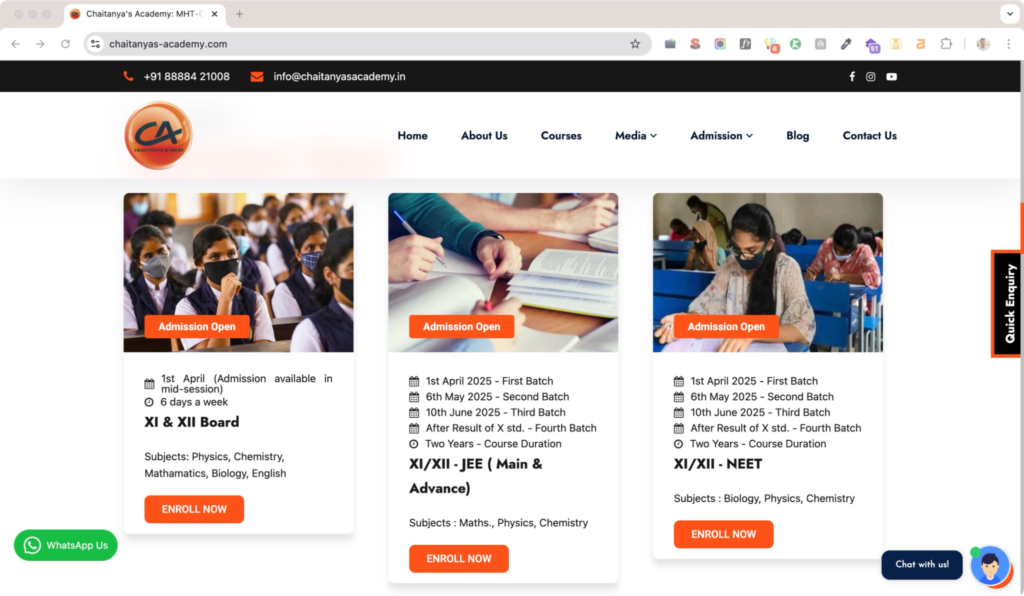How to Crack NEET in First Attempt: A Step by Step Guide
First of all, you have made a great decision by choosing NEET as your career opportunity. Because we really need doctors. You are choosing a path that not only shapes your future but also saves lives, impacts families, and contributes to society in a way that few other professions can.
It’s not an easy journey, and I know many of you might already be feeling the weight of expectations and challenges. But don’t worry, today, I’m here to make this journey a little clearer and a lot more achievable for you.
By the end of this blog, you’ll have a step-by-step strategy to crack NEET in your first attempt. And I promise you’ll leave here feeling more confident and motivated. So let’s get started!
Strategies and tips to crack NEET in first attempt

Some of you might be in Class 11, while others might be in Class 12, but these strategies and tips work for both. This blog is written with both classes in mind to help you crack NEET in your first attempt.
Before diving into the strategies, it’s important to familiarize yourself with the NEET 2025 syllabus, as understanding the syllabus is the foundation of effective preparation.
Understanding the NEET syllabus

The first step in cracking NEET is to get familiar with the syllabus. NEET covers topics from Physics, Chemistry, and Biology (Botany and Zoology), and understanding the entire syllabus will give you a clear roadmap for your preparation.
Now, you might be wondering, “The syllabus is the same every year, so why is everyone emphasizing it?” Well, the syllabus isn’t always static. The National Testing Agency (NTA) occasionally makes changes by adding or removing certain topics. So, staying updated with the official syllabus is essential to ensure you’re not missing out on any recent modifications.
📌 Related: NEET Reduced Syllabus 2025
Once you have the syllabus, focus on prioritizing topics that carry more weight in the exam. These topics are often where you can score the most marks with the right preparation.
But remember, don’t neglect any part of the syllabus. Even topics that seem less significant can have a few questions that can make a difference in your score.
Pro tip: If you’re running low on time, removing low-weightage topics can be a great time-saver. But make sure to analyze each topic carefully before skipping it. Prioritize understanding core concepts that are frequently tested in the exam.
Develop good study habits

Good study habits are the foundation of success in NEET preparation. To ensure you’re on the right track, follow these pointers:
Create a consistent study routine
Dedicate specific hours each day to study. Stick to the same time every day to build consistency and make study time a habit.
Set realistic goals
Break your larger goals into smaller, achievable targets for each study session. This will give you a sense of accomplishment and keep you motivated.
Avoid multitasking
Focus on one subject or topic at a time. Multitasking can reduce the quality of your study and lead to confusion.
Break study sessions into focused blocks
Study for 2-3 hours at a stretch, followed by a 15-20 minute break. This helps maintain focus and prevents burnout.
Use the Pomodoro technique
If you’re not able to manage long hours of study, break your study into 25-minute sessions with 5-minute breaks in between, followed by a longer break after four sessions. This technique enhances productivity.
Track your progress
Maintain a study journal to note your daily achievements, areas where you struggled, and topics to revisit. This will help you stay organized and track your improvements over time.
Stay disciplined and manage your time
Having a set routine will help you manage time more effectively and create a disciplined approach to your preparation.
Pro tip: Learn tips from toppers for NEET preparation by watching their interviews to see how they prepare for NEET!
Study smart, not just hard

Simply working hard is not enough. To study smartly, focus on understanding concepts deeply rather than memorizing information. Use active learning techniques like summarizing what you’ve studied in your own words or teaching the concept to someone else (your friends).
Practice solving problems, as this will improve both your analytical skills and time management during the exam. Focus on NCERT books for a solid foundation and use only the best NEET books for extra practice to avoid confusion.
Did you know almost 80-85% of NEET questions are directly or indirectly from NCERT books?
Revise regularly

Think about how you learned the lyrics to your favorite song. You didn’t memorize it in one go — you listened repeatedly until you knew it by heart. Starting NEET 2025 preparation works the same way. Regular revision ensures the information sticks.
You can start with daily revision, then move to weekly and monthly reviews. Use concise notes for quick reviews and group your revision by topics. In short,
- Spend 15-30 minutes daily reviewing what you studied.
- Review everything weekly you’ve learned during the week.
- Do a full review monthly to track your progress and address weak areas.
Integrate school and NEET syllabus

Many of you might be wondering how to manage school and NEET together. Don’t worry! Let me simplify it for you.
Many concepts in school align with the NEET syllabus, so integrate both. If you study a topic in school, make sure to revise it for NEET simultaneously. This prevents you from learning the same thing twice and helps you retain information longer.
Additionally, school exams can serve as practice for NEET preparation. Pay attention to the concepts covered in school lessons and use them as a base for more advanced NEET preparation.
Utilize your school time as much as you can

While preparing for NEET, don’t neglect your schoolwork. School lectures are an excellent resource for building your foundation. Actively participate in classroom discussions, ask questions to clear any doubts, and ensure you understand every concept thoroughly.
Use your school assignments, projects, and textbooks as additional resources to supplement your NEET studies. The more effectively you use your school time, the less burden you’ll face when preparing for NEET outside school hours.
For instance, if you’re studying Newton’s Laws of Motion in school physics, this topic is directly related to the NEET syllabus. Instead of treating it as a separate subject, apply what you learn in school to your NEET preparation. In school, focus on the basic concepts, and outside school, dive deeper into solving NEET-level problems related to these laws.
Solve mock tests and DPPs

Mock tests and DPPs (daily practice papers) are important for NEET preparation. They help you get used to the exam pattern and improve your time management. Try to solve one mock test each week, and do more as the exam gets closer.
Focus on understanding your mistakes and learning from them. DPPs are smaller sets of problems that help you practice daily and improve your speed and accuracy.
Suppose you’re taking a mock test on organic chemistry and have trouble with questions about reaction mechanisms. After reviewing your answers, you realize you missed some key steps. To fix this, you solve DPPs that focus on reaction mechanisms. By practicing more, you get better at solving these questions quickly and correctly.
Use your holiday wisely

Holidays present an excellent opportunity to accelerate your NEET preparation. During holidays, try to cover topics that you find challenging or need extra practice on. Create an effective NEET preparation study plan that includes revision of previous topics, learning new concepts, and solving problems.
Avoid wasting time on unproductive activities. Instead of spending all your time binge-watching or using social media, dedicate a portion of it to NEET preparation. This doesn’t mean you have to study all day, but setting aside 6-7 hours to focus on challenging subjects will make a huge difference.
Avoid too many books

One of the most common mistakes NEET aspirants make is following too many books, which can lead to confusion and waste time. Stick to a few reliable resources. For Physics, Chemistry, and Biology, NCERT textbooks are essential, as they are in sync with the NEET syllabus.
If needed, refer to additional books for extra practice. Focus on mastering these books and ensure you understand the key concepts from each.
| Subject | Recommended Books |
| Physics | – NCERT Physics Textbook- Objective Physics by D.C. Pandey- Concepts of Physics by H.C. Verma |
| Chemistry | – NCERT Chemistry Textbook- Organic Chemistry by Morrison and Boyd- Physical Chemistry by O.P. Tandon |
| Biology | – NCERT Biology Textbook- Trueman’s Biology- Biology Vol. 1 & 2 by Cengage |
By sticking to these books, you’ll save time and avoid confusion while ensuring you’re well-prepared for the NEET exam.
Join a reputed NEET coaching institute
While self-study is important, a good NEET coaching institute can provide guidance and structure to your preparation. Choose a coaching institute with a track record of success. Look for institutes like Chaitanya’s Academy that offer experienced faculty, well-organized study materials, doubt-solving sessions, and regular mock tests.

Chaitanya’s Academy also provides peer interaction and motivates you to push your limits. It has a strong history of helping students succeed and offers both classroom and online coaching.
Program offered by Chaitanya’s Academy

Two-year program for class 11 students
This program is great for those starting early. It covers the entire NEET syllabus over two years, with enough time for revision and practice.
One-year program for class 12 students
For students starting NEET preparation in Class 12, this course focuses on a clear understanding of the syllabus.
Stay consistent and disciplined

Consistency is one of the biggest factors that determines success in NEET. Stick to your study schedule, even on days when motivation is low. Discipline your mind to avoid distractions like social media or unproductive activities.
Set daily, weekly, and monthly goals to keep yourself accountable and on track. A well-planned NEET study timetable keeps your preparation organized and consistent. Having a disciplined approach will keep you focused on your objective of cracking NEET in the first attempt.
Remember, motivation might keep you going for a few days or weeks, but consistency is what drives long-term success. It’s the key to staying on track and making steady progress.
Stay healthy and manage stress

Your mental and physical health are crucial for success in NEET preparation. Taking care of yourself helps you stay focused and productive.
- Eat nutritious food to fuel your body and mind.
- Drink plenty of water to stay hydrated and alert.
- Get enough sleep to recharge and improve memory retention.
- Do physical exercise like walking, yoga, or stretching to keep your body active and reduce stress.
These habits keep your brain functioning at its best, reduce stress, and improve concentration.
Mental well-being is equally important, so practice mindfulness, meditation, or deep breathing exercises to manage anxiety. Don’t let stress overwhelm you—balance study time with relaxation to stay productive.
Ready to crack NEET in first attempt?
Every year, over 18 lakh students appear for NEET. For NEET UG 2024–2025, more than 24 lakh students have applied. However, with limited medical seats available, cracking NEET isn’t just about studying hard—it’s about studying smart, dedication, right guidance, and a lot of consistent effort.
At Chaitanya’s Academy, one of the best NEET institutes in India, we understand the challenges of NEET preparation and are committed to helping you succeed. With experienced mentors, proven teaching methods, and personalized support, we empower students to reach their full potential.
To make quality education accessible, we offer scholarship for NEET students, covering up to 100% fees for deserving students. Our track record speaks for itself, with countless students achieving their dreams of joining prestigious medical colleges.
Remember, NEET is not just an exam—it’s the first step towards making a meaningful impact as a future doctor.
Stay consistent 💪, stay confident 💡, and trust the process. Chaitanya’s Academy is here to guide you every step of the way. Best of luck with your NEET journey! 🌟



